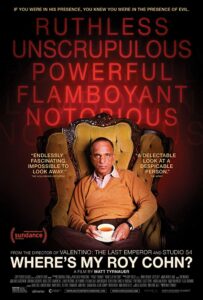From Witch Hunt to “Witch Hunt”


Roy Cohn died in 1986, but he never really left. The man died more than 30 years ago, but his tactics, his personality, and his amorality is on daily display in Donald Trump’s White House.
In Tony Kushner’s prize-winning drama “Angels in America”, the villain is disgraced attorney-fixer Roy Cohn, a character usually played with a dastardly evilness that reaches almost comic-book proportions.
When then-attorney general Jeff Session’s insisted on recusing himself from then-special counsel Robert Muller’s investigation into Russia’s alleged interference in the 2016 presidential election, a furious, exasperated Donald Trump turned to his White House advisers and asked, “Where’s my Roy Cohn?” As in “who can bribe, cajole, blackmail, almost kill for me?”

As filmmaker Matt Tyrnauer learned of Trump’s plaint, he knew he had found the title for his documentary on Roy Cohn – a project Tyrnauer had considered the moment Donald Trump became the 45th president of the United States.
He knew about the peculiar bond that once existed between Cohn and Trump. In 1973, Cohn was defending Donald and his dad Fred from being sued by the Department of Justice for racial discrimination – the Trump company was excluding blacks and Hispanics from their housing projects. The case was settled, with no admission of guilt.
“A settlement is a win,” Cohn explained.
To Trump, a young and impressionable protégé, Cohn imparted the wisdom of his trade.
“Attack. Don’t apologize. Never acknowledge you’re wrong.”
The “friendship” lasted for 13 years, until word got out that Roy Cohn had AIDS. Trump, a well-known hypochondriac, dropped his mentor.

With the help of archival footage, “Where’s My Roy Cohn?” takes us through the highs and lows of Roy Cohn’s life.
A child prodigy, at the age of 24 he was a Justice Department lawyer helping to prosecute Ethel and Julius Rosenberg, accused of nuclear secrets espionage. The couple was convicted and executed. This “win” led J. Edgar Hoover, then director for the FBI, to recommend Cohn to Senator Joseph R. McCarthy, who was planning a series of investigative hearings to root out communists.
The McCarthy hearings were more or less run by the senator and young Cohn. They destroyed the lives and livelihoods of thousands of people, many federal workers, many in the entertainment industry. As if this wasn’t enough, Cohn convinced McCarthy to go after the US Army – for a very personal reason. The resulting 1954 Army-McCarthy hearings turned into a famous fiasco, culminating in the televised outburst by the Army’s attorney Joseph Welch, “Have you no sense of decency sir, at long last?”

But it is the movie’s very personal interviews with people who knew Cohn the best that make you pay attention. Feel a bit nauseous, even. Because, just how evil was this man? His “friends” mince no words:
“Beyond Machiavellian.”
“A personality in disarray. He had no boundaries. No scruples.”
“Ruthless.”
“You felt you were in the presence of evil.”
“You felt you were in the presence of evil.”
“He would take a fight against anybody.”
“Roy would get his lack of ethics, his lack of empathy, from Dora.”
Dora was Roy Cohn’s mother. His younger cousins, Dave and Gary Marcus, are eager to spill family history. Dora was the ugliest girl in the Bronx, and she had such a difficult personality, they claim, the wealthy family bought her a poor man by offering him a judgeship. Roy, grew up an only, spoiled child, and lived with his mother, ”the original helicopter parent” (David Marcus) until she died.
The hypocrisy revealed in the documentary is astounding. As President, Cohn’s good friend Ronald Reagan pretended that AIDS didn’t exist, yet he helped Cohn get experimental drug treatment. In his lifetime, Roy Cohn denied he had AIDS, denied he was gay, yet “everybody” knew. His boyfriend Wallace Adams says he would attend parties full of anti-gay Republicans as Roy’s companion, and nobody minded.
Roy Cohn’s heyday as a unscrupulous New York lawyer was the amoral mid-1950s. Among his celebrity clients were Aristotle Onassis and George Steinbrenner, but he advised Mafia clients as well, protected Catholic archbishops, and introduced Robert Murdoch to influential acquaintances.
In the last 20 years of his career, Cohn was investigated by federal authorities for perjury, witness tampering, and theft from clients. There was also the matter of his yacht, the “Defiance”, which mysteriously caught fire and sank, killing a crew member. Shortly before his death, Cohn was disbarred for unethical and unprofessional conduct.
Matt Tyrnauer is connecting the dots among power brokers, criminals, politicians, and supposedly democratic institutions with brilliant ease. Understanding how blind ambition can go tragically mad is both frightening and enthralling.
The timing of “Where’s My Roy Cohn?” is perfect.
